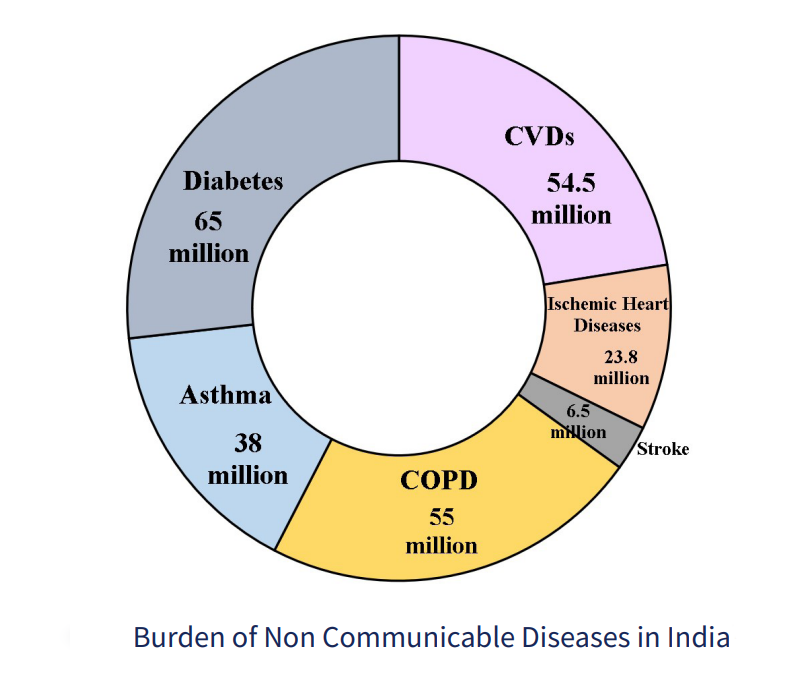Governance
Palliative Care in India
- 12 Jul 2023
- 6 min read
For Prelims: Non-communicable diseases, Cancer, Diabetes, Right to health, Global Action Plan for the Prevention and Control of NCDs, World Health Assembly, National Health Mission, National Programme for Prevention & Control of Non-Communicable Diseases
For Mains: Status of Palliative Care in India
Why in News?
India, with nearly 20% of the world's population, faces a significant burden of non-communicable diseases. Conditions such as cancer, diabetes, hypertension, and respiratory diseases are on the rise, necessitating the need for palliative care.
- However, the availability and accessibility of palliative care in India are limited.
What is Palliative Care?
- Palliative care is explicitly recognized under the human right to health and it is a type of medical care that focuses on improving the quality of life for people with serious illnesses.
- It helps to prevent suffering and aims to identify patients who may be receiving too many medical treatments that don't improve their quality of life and may cause financial strain on their families.
- It is meant to address physical, psychological, spiritual, and social needs for people with conditions like heart failure, kidney failure, certain neurological diseases, cancer etc.
- According to WHO, each year an estimated 40 million people are in need of palliative care, 78% of whom live in low- and middle-income countries.
- Also worldwide, only about 14% of people who need palliative care currently receive it.
- Furthermore, WHO explicitly recognized that palliative care is part of the comprehensive services required for NCDs through the Global Action Plan for the Prevention and Control of NCDs 2013–2020
- In 2019, the World Health Assembly extended the WHO Global action plan for the prevention and control of NCDs 2013–2020 to 2030.
Note:
- Non-Communicable Diseases (NCDs) are chronic diseases that are not transmissible from one person to another. NCDs include a wide spectrum of medical disorders, both acute and chronic, like Cancers, Diabetes, Hypertension, Cardiovascular Diseases etc.
What is the Status of Palliative Care in India?
- Status:
- Palliative care in India is primarily available in urban areas and at tertiary healthcare facilities. Only 1-2% of the estimated 7-10 million people in India who need palliative care have access to it.
- Palliative Care Programme in India:
- Although no separate budget is allocated for the implementation of the National Palliative Care Program, palliative care is part of the ‘Mission Flexipool’ of National Health Mission (NHM).
- National Programme for prevention & Control of Cancer, Diabetes, Cardiovascular Diseases & stroke (NPCDCS) that was launched in 2010 and later revised as National Programme for Prevention & Control of Non-Communicable Diseases (NP-NCD), also aims to address the increasing burden of noncommunicable diseases in India, aims to provide promotive, preventive, and curative care across all levels of healthcare.
- Challenges:
- Limited Awareness: There is a lack of awareness and understanding about palliative care among the general public and healthcare professionals.
- Many people in India are not aware of the benefits of palliative care or confuse it with end-of-life care.
- Inadequate Infrastructure and Insufficient Training: There is a shortage of dedicated palliative care centers, hospices, and trained healthcare professionals in India.
- Also, healthcare professionals, including doctors, nurses, and other caregivers, often lack adequate training in palliative care.
- This limits their ability to provide appropriate pain and symptom management and psychosocial support to the patient.
- Lack of Attention Towards Pediatric Care: Paediatric palliative care has also been neglected for a long time. About 98% of children facing moderate to severe suffering during their end of life reside in lower and middle-income countries like India.
- This could be due to diseases like cancer, birth defects, neurological conditions, etc.
- The revised operational guidelines of NP-NCD have also not addressed this issue.
- Limited Implementation of NPCC: The implementation of this program has been slow and uneven, resulting in limited progress in expanding palliative care services.
- Limited Awareness: There is a lack of awareness and understanding about palliative care among the general public and healthcare professionals.
Way Forward
- Strengthening the implementation and monitoring of the NPPC at the state level with adequate funding, human resources, infrastructure etc.
- Developing and implementing national standards and guidelines for palliative care services and quality assurance.
- Enhancing the education and training of palliative care professionals and volunteers at various levels and settings.
- The 67th World Health Assembly in 2014 urged the integration of palliative care into health systems at all levels.
- There is a need to improving the referral and linkage mechanisms between different levels and types of health care providers for palliative care







